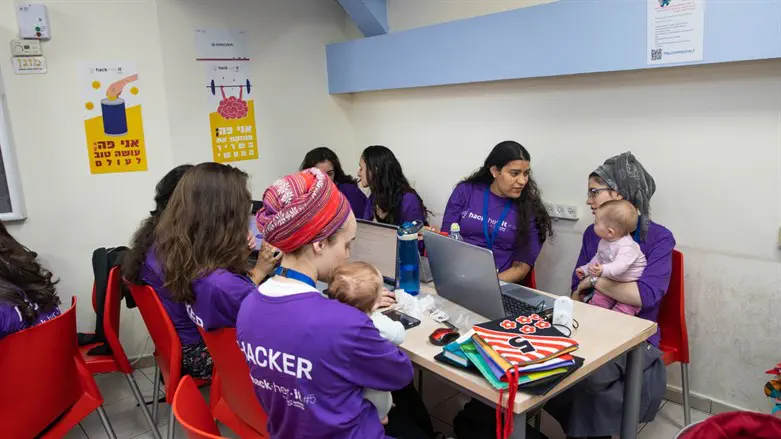
Addressing the struggle faced by countless senior citizens around the world who have difficulty operating everyday technological devices, a group of religious women taking part in the Jerusalem College of Technology LevTech Entrepreneurship Center’s 5th annual Women’s Hackathon developed an innovative solution which was crowned the winner of the competition.
The group developed “EasySurf,” a mechanism that enables seniors to have easier access to modern-day technology, especially when it comes to accessing information on a screen. Their efforts to solve a challenge presented by OrCam — a company that creates artificial intelligence solutions to empower others — earned them a cash prize.
The team’s device provides customized support by automating access to critical websites for senior citizens like social security and HMOs. It offers easier access to calling close friends and family members. The device must be set up by a trusted person close to the senior citizen and is then programmed to remember how to access these portals with one quick click of a button moving forward.
The 45-hour hackathon brought 140 religious women together to develop potentially lifesaving technologies. The hackathon included students from JCT’s Tal, Lustig, and Tavuna campuses, prompting them to develop a wide array of solutions to pressing problems.
Some of the other companies which participated in the hackathon were Intel, Medtronic, Alpha-TAU, Rafael, United Hatzalah, the Israel Police, and the Havatzalot Program. Havatzalot is an elite program in the Israel Defense Forces aimed at training highly skilled intelligence officers for key roles in Israel’s Military Intelligence Directorate.
“The hackathon provides an experiential learning experience from the high-tech world that is based on real demands in the field,” said Orlee Guttman, co-founder of LevTech Entrepreneurship Center at JCT. “Each student demonstrated creativity and sophistication that impressed the judges, and their performance in this hackathon will propel them for success in various high-tech positions upon graduation.”
Yakir Winograd, an algorithm engineer at OrCam, marveled, “The students came into the hackathon with a good deal of knowledge and asked precise questions in order to reach their goal.”
Coming in second place was a group that developed “Defifly,” which initiates a flying defibrillator that can be summoned by phone, to address a challenge presented by United Hatzalah and FlyTech. The flying defibrillator addresses the situation when an individual is in cardiac arrest and needs a defibrillator to immediately restart the heart, but the ambulance is too far away or stuck in traffic.
In third place was the group that developed “EyeCare,” another team which worked with OrCam. That team created a camera which would detect if a child is forgotten in a closed and parked vehicle; the camera would subsequently alert the driver and appropriate authorities.
Oren Weil, a Windows software architect at Intel, commented, “An engineer must know how to recognize a problem and break it down so he or she can find the right solution. These women definitely have the brain of an engineer.”
The annual hackathon is well-aligned with JCT’s unique role as an institution that provides a religiously sensitive environment as well as expanded access to engineering, health sciences, and finance education for Orthodox and modern Orthodox women. JCT trains approximately 18% of all women studying computer science in Israel.
